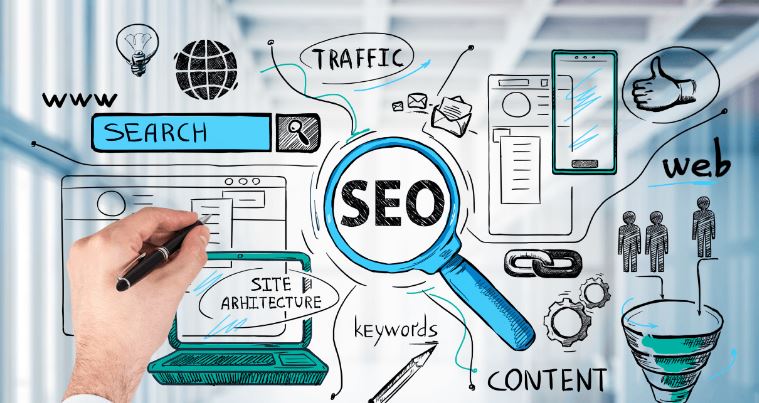Premium Link-Building Services
Explore premium link-building options to boost your online visibility.
Explore premium link-building options to boost your online visibility.

As a medium-sized enterprise (MSE), your business sits at a pivotal stage. You've already established your presence in the market and now face the challenge of scaling your operations to reach a larger audience. This growth phase is critical, and your online presence will play a significant role in determining how successfully you expand. A well-executed SEO strategy is one of the most effective ways to increase your visibility, drive more traffic to your website, and ultimately grow your business.
In this article, we will explore how medium-sized enterprises can leverage SEO to scale their online presence, attract more customers, and achieve long-term success.
Search Engine Optimization (SEO) is the process of improving your website’s visibility in search engine results, which can help attract organic traffic without relying heavily on paid advertising. For medium-sized enterprises, SEO offers several key advantages:
Cost-Effective Growth: SEO is more affordable than traditional advertising and provides long-term results. Once your website is optimized, you continue to receive traffic without paying per click or impression, as you would with paid ads.
Increased Credibility: Ranking high on search engines like Google adds credibility to your brand. Consumers trust search engines, and appearing on the first page signals that your company is a trusted leader in its field.
Targeted Traffic: SEO enables you to attract users who are actively searching for your products or services. This type of targeted traffic is more likely to convert into paying customers, helping you scale more efficiently.
Sustainable Growth: SEO helps build a solid foundation for long-term success by driving consistent traffic to your website. While other marketing strategies may offer short-term boosts, SEO provides a steady stream of potential customers over time.
Given the benefits, a well-planned SEO strategy is a must for any medium-sized enterprise looking to scale its online presence.
Scaling an SEO strategy for a medium-sized business requires a combination of techniques designed to improve your website's performance, content relevance, and authority. Below are the essential SEO strategies to help your enterprise grow.
Effective SEO begins with thorough keyword research. For medium-sized enterprises, it’s important to target both broad and long-tail keywords that attract a diverse range of users.
Here’s how to conduct keyword research for your business:
Identify Core Industry Keywords: Start with the most relevant, high-volume keywords related to your industry. For example, if you run an e-commerce business selling furniture, your core keywords might include “modern furniture” or “office chairs.”
Target Long-Tail Keywords: Long-tail keywords are longer, more specific phrases that typically have lower search volume but higher intent. For example, “ergonomic office chairs for small spaces” is a long-tail keyword. These keywords attract users who are closer to making a purchase decision, making them valuable for driving conversions.
Use Keyword Tools: Tools like Ahrefs, SEMrush, and Google Keyword Planner can help you discover new keyword opportunities and analyze the competition for each term. Aim to balance between high-competition keywords (which have high search volume) and less competitive, niche keywords that offer quick wins.
Once you’ve identified your target keywords, integrate them naturally into your website’s content, including page titles, headers, meta descriptions, and product descriptions.
Content remains the cornerstone of any successful SEO strategy. To scale your online presence, focus on creating high-quality, engaging content that addresses the needs of your target audience. Content marketing not only attracts traffic but also positions your enterprise as a thought leader in your industry.
To scale your content efforts:
Develop a Content Calendar: Plan out a consistent content schedule, including blog posts, case studies, how-to guides, and industry insights. Regularly updating your website with fresh content signals to search engines that your site is active and relevant.
Focus on Evergreen Content: While timely content (e.g., news updates or trending topics) can generate spikes in traffic, evergreen content (content that remains relevant over time) provides long-term value. Examples of evergreen content include industry guides, FAQs, and tutorials.
Diversify Content Formats: Don’t limit your content to just blog posts. Expand into videos, infographics, podcasts, and webinars. Visual and multimedia content tends to engage users more deeply, increasing the likelihood they’ll stay on your site longer—an important SEO ranking factor.
Optimize Content for SEO: Incorporate your targeted keywords naturally into your content, but avoid keyword stuffing. Ensure each piece of content is optimized with relevant meta tags, image alt text, and internal links.
A strong content strategy not only attracts new visitors but also encourages repeat visits, increasing the lifetime value of each customer.
A fast, user-friendly website is crucial for SEO success, especially as your enterprise scales and traffic grows. Google prioritizes websites that offer a positive user experience, and poor site performance can negatively affect your search rankings.
Here’s how to optimize your website for performance:
Ensure Mobile-Friendliness: With mobile traffic surpassing desktop usage, your website must be fully optimized for mobile devices. Use a responsive design that adapts to different screen sizes and provides a seamless browsing experience on both mobile and desktop.
Boost Page Load Speed: Slow-loading websites have higher bounce rates, which can hurt your SEO performance. Use tools like Google PageSpeed Insights to identify bottlenecks and improve your site’s loading times by compressing images, minifying code, and leveraging browser caching.
Improve Site Navigation: A well-organized site structure helps both users and search engines find content more easily. Use clear categories and subcategories for products and services, and implement internal links to guide users to relevant content.
Secure Your Website: An SSL certificate not only protects your customers’ data but is also a ranking factor for Google. Ensure your site uses HTTPS to build trust and improve your SEO performance.
Prioritizing user experience can lead to higher engagement rates, more conversions, and better search engine rankings.
Backlinks—links from other reputable websites to your site—are one of the most important ranking factors in SEO. As a medium-sized enterprise, building a strong backlink profile can significantly boost your website’s authority and help it rank higher in search results.
To earn high-quality backlinks:
Create Link-Worthy Content: Produce valuable, shareable content that other websites want to link to. This could include in-depth research reports, industry white papers, or comprehensive guides.
Engage in Guest Blogging: Reach out to industry blogs and publications and offer to write guest posts in exchange for a link back to your site. Guest blogging is a great way to increase your exposure and earn valuable backlinks.
Collaborate with Industry Influencers: Partnering with influencers or industry experts for interviews, product reviews, or co-authored content can help you earn backlinks from authoritative websites.
Utilize Broken Link Building: Use tools like Ahrefs to find broken links on other websites and offer your content as a replacement. This method helps both you and the website owner by providing a solution to their broken links while earning you a valuable backlink.
Consistent backlink-building efforts help establish your website as an authority in your niche, improving your rankings over time.
Even as a medium-sized enterprise, targeting local markets can be a powerful way to increase your visibility, especially if you have physical locations or serve specific regions. Local SEO helps your business appear in location-based searches, such as “best office furniture supplier in Vienna.”
To optimize for local SEO:
Claim Your Google My Business Listing: Ensure your Google My Business (GMB) profile is complete and accurate, with updated contact information, business hours, and services. This helps your business appear in Google’s local pack, which displays nearby businesses for local searches.
Optimize for Local Keywords: Use location-based keywords, such as your city or region, in your page titles, meta descriptions, and content. For example, include phrases like “corporate furniture supplier in Vienna” to attract local customers.
Encourage Customer Reviews: Positive reviews on Google My Business and other review platforms like Yelp help build trust and improve your local search rankings. Encourage satisfied customers to leave reviews, and be sure to respond to them.
Focusing on local SEO ensures you capture search traffic from customers in your immediate area, which can lead to faster sales growth.
SEO is an ongoing process, and regularly tracking your performance is essential to scaling successfully. Use analytics tools to monitor your SEO efforts and identify areas for improvement.
Key performance metrics to track:
Organic Traffic: Measure the number of visitors coming to your site from search engines. An increase in organic traffic indicates that your SEO efforts are paying off.
Keyword Rankings: Track the performance of your target keywords using tools like Ahrefs or SEMrush. Adjust your content strategy based on which keywords are driving the most traffic.
Bounce Rate: A high bounce rate may indicate poor user experience or irrelevant content. Improving site speed, mobile-friendliness, and content quality can help reduce bounce rates.
Conversion Rates: Ultimately, the goal of SEO is to drive conversions. Track how well your website is converting visitors into leads or sales, and optimize your site accordingly.
For medium-sized enterprises, SEO is a powerful tool for scaling your online presence and attracting more customers. By focusing on comprehensive keyword research, creating high-quality content, optimizing your website’s performance, building backlinks, and leveraging local SEO, your business can increase its visibility and grow organically.
Investing in these SEO strategies will not only help you rank higher in search results but also position your enterprise for long-term success in an increasingly competitive digital marketplace.
